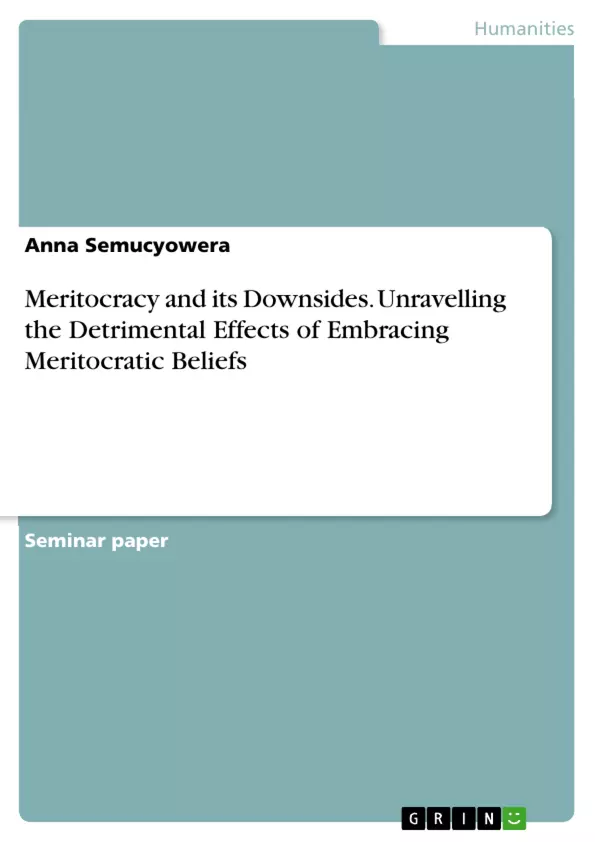This paper explores the pervasive societal belief in meritocracy as an antidote to social inequalities, widely endorsed by politicians and Americans alike. While meritocracy promises individual agency and upward mobility, this study delves into its latent psychological pitfalls. Examining consequences such as diminished empathy, low self-esteem, and self-blame, we unravel the paradoxical impact of meritocratic ideals. This analysis sheds light on the nuanced drawbacks of embracing meritocracy, prompting a reevaluation of its implications for both individuals and broader societal well-being.
Table of Contents
- Meritocracy and its downsides: Why the endorsement of meritocratic beliefs might be bad for you
- Self-blame
- Lack of empathy
Objectives and Key Themes
This text explores the potential negative psychological consequences of endorsing meritocratic beliefs. It examines how the belief that success is solely determined by individual merit can lead to detrimental effects on individuals and society.
- The relationship between meritocratic beliefs and self-blame among individuals in lower social positions.
- The impact of meritocratic beliefs on empathy and compassion towards disadvantaged groups.
- The role of system-justification in perpetuating social inequalities.
- The psychological mechanisms underlying the acceptance of social inequalities by individuals in both high and low status groups.
- The negative consequences of self-blame on mental health and well-being.
Chapter Summaries
Meritocracy and its downsides: Why the endorsement of meritocratic beliefs might be bad for you: This chapter introduces the concept of meritocracy and its widespread acceptance. It argues that while meritocracy is often viewed positively, its endorsement can have significant negative psychological consequences, including increased self-blame and reduced empathy for the disadvantaged. The chapter sets the stage for exploring these consequences in greater detail.
Self-blame: This section delves into the link between meritocratic beliefs and self-blame. It argues that individuals who strongly believe in meritocracy are more likely to attribute their lack of success to personal failings rather than systemic factors. Studies are cited showing that individuals in lower social strata who endorse meritocracy tend to blame themselves or their in-groups for their circumstances, even in the face of discrimination. The chapter highlights the dangers of internalizing negative evaluations from out-groups and the potential impact on mental health.
Lack of empathy: This section examines how meritocratic beliefs can hinder empathy and compassion for those less fortunate. It suggests a negative correlation between system-justifying beliefs (like those inherent in meritocracy) and the willingness to help disadvantaged groups. By accepting the status quo, individuals may rationalize social inequalities, leading to a decreased sense of moral outrage and reduced support for policies aimed at helping the disadvantaged. The chapter connects this lack of empathy to cognitive dissonance and the use of stereotypes to justify inequalities.
Keywords
Meritocracy, self-blame, system-justification, empathy, social inequality, discrimination, cognitive dissonance, mental health, well-being, low self-esteem, system-justifying beliefs.
Frequently Asked Questions: Meritocracy and its Downsides
What is the main topic of this text?
This text explores the potential negative psychological consequences of endorsing meritocratic beliefs. It examines how the belief that success is solely determined by individual merit can lead to detrimental effects on individuals and society.
What are the key themes explored in this text?
The key themes include the relationship between meritocratic beliefs and self-blame, the impact of meritocratic beliefs on empathy towards disadvantaged groups, the role of system-justification in perpetuating social inequalities, and the psychological mechanisms underlying the acceptance of social inequalities.
How does meritocracy relate to self-blame?
The text argues that individuals who strongly believe in meritocracy are more likely to attribute their lack of success to personal failings rather than systemic factors. This is especially true for those in lower social strata, who may internalize negative evaluations and blame themselves or their in-groups, even in the face of discrimination.
What is the connection between meritocracy and a lack of empathy?
The text suggests a negative correlation between system-justifying beliefs (like those inherent in meritocracy) and empathy for the less fortunate. Acceptance of the status quo can lead to rationalization of social inequalities, resulting in decreased moral outrage and reduced support for policies aimed at helping disadvantaged groups.
What are the psychological mechanisms discussed in relation to accepting social inequalities?
The text discusses cognitive dissonance and the use of stereotypes as mechanisms that allow individuals to justify social inequalities and maintain a belief in meritocracy despite evidence to the contrary.
What are the negative consequences of self-blame highlighted in the text?
The text highlights the negative consequences of self-blame on mental health and well-being, including potentially contributing to low self-esteem.
What are the key chapters covered in this text?
The text includes chapters on Meritocracy and its downsides, Self-blame, and Lack of Empathy, each exploring different facets of the negative psychological consequences of endorsing meritocratic beliefs.
What keywords are associated with this text?
Keywords include Meritocracy, self-blame, system-justification, empathy, social inequality, discrimination, cognitive dissonance, mental health, well-being, low self-esteem, and system-justifying beliefs.
What is the overall conclusion of the text?
The text concludes that while meritocracy is often viewed positively, its endorsement can have significant negative psychological consequences, including increased self-blame and reduced empathy, ultimately impacting both individuals and society.
- Quote paper
- Anna Semucyowera (Author), 2023, Meritocracy and its Downsides. Unravelling the Detrimental Effects of Embracing Meritocratic Beliefs, Munich, GRIN Verlag, https://www.grin.com/document/1437585



